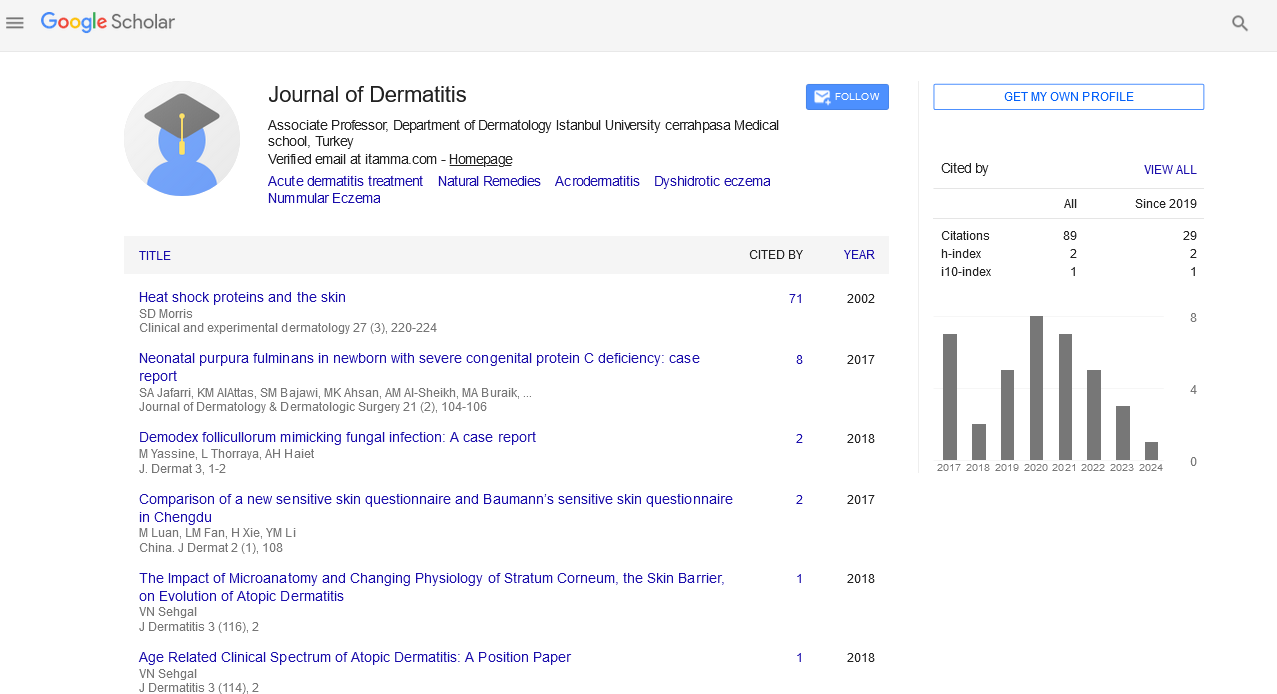Indexed In
- RefSeek
- Hamdard University
- EBSCO A-Z
- Euro Pub
- Google Scholar
Useful Links
Share This Page
Journal Flyer

Open Access Journals
- Agri and Aquaculture
- Biochemistry
- Bioinformatics & Systems Biology
- Business & Management
- Chemistry
- Clinical Sciences
- Engineering
- Food & Nutrition
- General Science
- Genetics & Molecular Biology
- Immunology & Microbiology
- Medical Sciences
- Neuroscience & Psychology
- Nursing & Health Care
- Pharmaceutical Sciences
Opinion Article - (2023) Volume 8, Issue 6
Complex Epidemiology of Psoriasis and Intricate Mechanisms of Skin Inflammation
Elin Davidey*Received: 17-Oct-2023, Manuscript No. JOD-23-23952; Editor assigned: 20-Oct-2023, Pre QC No. JOD-23-23952 (PQ); Reviewed: 03-Nov-2023, QC No. JOD-23-23952; Revised: 10-Nov-2023, Manuscript No. JOD-23-23952 (R); Published: 17-Nov-2023, DOI: 10.35248/2684-1436.23.8.227
Description
Millions of individuals suffer with psoriasis, a chronic, inflammatory skin condition. It is a multifaceted condition with a complex epidemiology, and its underlying mechanisms of skin inflammation are intricate and not yet fully understood. This article delves into the diverse factors contributing to the epidemiology of psoriasis and explores the intricate mechanisms involved in skin inflammation in psoriasis.
Epidemiology of psoriasis
Psoriasis affects people of all ages, genders, and ethnicities. Its epidemiology is multifaceted, influenced by a combination of genetic, environmental, and immunological factors.
Genetic predisposition: Research has shown a strong genetic component in the development of psoriasis. Several genes have been identified, including HLA-Cw6 and numerous immune- related genes, which play a role in the risk of psoriasis development.
Environmental triggers: Environmental factors can trigger or exacerbate psoriasis. These factors include infections, stress, smoking, alcohol consumption, and certain medications. Streptococcal throat infections, for example, are known to trigger guttate psoriasis, a subtype of the condition.
Immune dysregulation: Psoriasis is fundamentally an immune- mediated disorder. In individuals with psoriasis, T cells are overactive, leading to the release of inflammatory cytokines, such as Tumor Necrosis Factor-Alpha (TNF-α) and Interleukin-17 (IL-17), which contribute to skin inflammation.
Intricate mechanisms of skin inflammation
The inflammation observed in psoriasis is a result of a complex interplay between immune cells, keratinocytes (skin cells), and various cytokines.
Keratinocyte hyperproliferation: Psoriasis is characterized by the excessive proliferation of keratinocytes. In healthy skin, keratinocytes divide and differentiate in an orderly fashion. However, in psoriasis, this process is accelerated, leading to the formation of thickened, scaly plaques on the skin's surface.
Immune cell infiltration: Immune cells, particularly T cells, infiltrate the skin in large numbers in psoriasis lesions. These T cells become activated and produce pro-inflammatory cytokines that sustain the inflammatory response.
Cytokine cascade: A pivotal element of psoriasis pathogenesis is the cytokine cascade. Cytokines, such as TNF-α, IL-17, and IL-23, play crucial roles in perpetuating inflammation and stimulating keratinocyte hyperproliferation. These cytokines are the target of many biologic treatments for psoriasis.
Cross-talk between immune cells and keratinocytes: The interplay between immune cells and keratinocytes is a key driver of psoriasis. Immune cells release cytokines that stimulate keratinocytes to produce chemokines, which further attract immune cells to the skin, creating a self-sustaining loop of inflammation.
Complexity of comorbidities: Psoriasis is not merely a skin condition; it is associated with several comorbidities, including psoriatic arthritis, cardiovascular disease, and metabolic syndrome. These associations highlight the intricate nature of psoriasis and its systemic impact on the body.
Individualized treatment approaches: Given the complex mechanisms underlying psoriasis, treatment often requires a personalized approach. The choice of therapy depends on the severity of the disease, its subtype, and individual patient characteristics. Topical treatments, phototherapy, systemic medications, and biologic agents are among the options available, each targeting specific components of the psoriasis pathway.
In conclusion, psoriasis is a multifaceted skin disorder with a complex epidemiology influenced by genetics, environmental factors, and immune dysregulation. The intricate mechanisms of skin inflammation involve immune cell activation, cytokine dysregulation, and aberrant keratinocyte proliferation.
Developing effective treatments for psoriasis requires a comprehensive understanding of these mechanisms and individualized approaches to manage the disease and its associated comorbidities. As ongoing research sheds light on the intricacies of psoriasis, it offers hope for improved therapies and a better quality of life for those living with this challenging condition.
Citation: Davidey E (2023) Complex Epidemiology of Psoriasis and Intricate Mechanisms of Skin Inflammation. J Dermatitis. 8:227.
Copyright: © 2023 Davidey E. This is an open-access article distributed under the terms of the Creative Commons Attribution License, which permits unrestricted use, distribution, and reproduction in any medium, provided the original author and source are credited.

